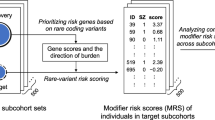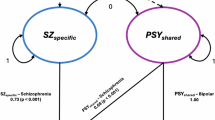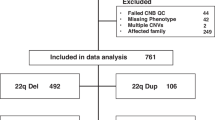Abstract
Certain pathogenic genetic variants impact neurodevelopment and cause deviations from typical cognitive trajectories. Understanding variant-specific cognitive trajectories is clinically important for informed monitoring and identifying patients at risk for comorbid conditions. Here, we demonstrate a variant-specific normative chart for cognitive development for individuals with 22q11.2 deletion syndrome (22q11DS). We used IQ data from 1365 individuals with 22q11DS to construct variant-specific normative charts for cognitive development (Full Scale, Verbal, and Performance IQ). This allowed us to calculate Z-scores for each IQ datapoint. Then, we calculated the change between first and last available IQ assessments (delta Z-IQ-scores) for each individual with longitudinal IQ data (n = 708). We subsequently investigated whether using the variant-specific IQ-Z-scores would decrease required sample size to detect an effect with schizophrenia risk, as compared to standard IQ-scores. The mean Z-IQ-scores for FSIQ, VIQ, and PIQ were close to 0, indicating that participants had IQ-scores as predicted by the normative chart. The mean delta-Z-IQ-scores were equally close to 0, demonstrating a good fit of the normative chart and indicating that, as a group, individuals with 22q11DS show a decline in IQ-scores as they grow into adulthood. Using variant-specific IQ-Z-scores resulted in 30% decrease of required sample size, as compared to the standard IQ-based approach, to detect the association between IQ-decline and schizophrenia (p < 0.01). Our findings suggest that using variant-specific normative IQ data significantly reduces required sample size in a research context, and may facilitate a more clinically informative interpretation of IQ data. This approach allows identification of individuals that deviate from their expected, variant-specific, trajectory. This group may be at increased risk for comorbid conditions, such as schizophrenia in the case of 22q11DS.
Similar content being viewed by others
Log in or create a free account to read this content
Gain free access to this article, as well as selected content from this journal and more on nature.com
or
References
Steele A, Scerif G, Cornish K, Karmiloff-Smith A. Learning to read in Williams syndrome and Down syndrome: syndrome-specific precursors and developmental trajectories. J Child Psychol Psychiatry. 2013;54:754–62.
Bernier R, Hudac CM, Chen Q, Zeng C, Wallace AS, Gerdts J, et al. Developmental trajectories for young children with 16p11.2 copy number variation. Am J Med Genet B Neuropsychiatr Genet. 2017;174:367–80.
Hall SS, Burns DD, Lightbody AA, Reiss AL. Longitudinal changes in intellectual development in children with Fragile X syndrome. J Abnorm Child Psychol. 2008;36:927–39.
Franic S, Dolan CV, van Beijsterveldt CE, Hulshoff Pol HE, Bartels M, Boomsma DI. Genetic and environmental stability of intelligence in childhood and adolescence. Twin Res Hum Genet. 2014;17:151–63.
Smeets EE, Townend GS, Curfs LMG. Rett syndrome and developmental regression. Neurosci Biobehav Rev. 2019;104:100–01.
Einspieler C, Marschik PB. Regression in Rett syndrome: developmental pathways to its onset. Neurosci Biobehav Rev. 2019;98:320–32.
Ballard C, Mobley W, Hardy J, Williams G, Corbett A. Dementia in Down’s syndrome. Lancet Neurol. 2016;15:622–36.
Startin CM, D’Souza H, Ball G, Hamburg S, Hithersay R, Hughes KMO, et al. Health comorbidities and cognitive abilities across the lifespan in Down syndrome. J Neurodev Disord. 2020;12:4.
Grieco J, Pulsifer M, Seligsohn K, Skotko B, Schwartz A. Down syndrome: Cognitive and behavioral functioning across the lifespan. Am J Med Genet C Semin Med Genet. 2015;169:135–49.
Patterson T, Rapsey CM, Glue P. Systematic review of cognitive development across childhood in Down syndrome: implications for treatment interventions. J Intellect Disabil Res. 2013;57:306–18.
Davies G, Tenesa A, Payton A, Yang J, Harris SE, Liewald D, et al. Genome-wide association studies establish that human intelligence is highly heritable and polygenic. Mol Psychiatry. 2011;16:996–1005.
Batty GD, Deary IJ, Gottfredson LS. Premorbid (early life) IQ and later mortality risk: systematic review. Ann Epidemiol. 2007;17:278–88.
Kahn RS, Keefe RS. Schizophrenia is a cognitive illness: time for a change in focus. JAMA Psychiatry. 2013;70:1107–12.
Zemel BS, Pipan M, Stallings VA, Hall W, Schadt K, Freedman DS, et al. Growth charts for children with Down syndrome in the United States. Pediatrics. 2015;136:e1204–11.
Mircher C, Briceno LG, Toulas J, Conte M, Tanguy ML, Cieuta-Walti C, et al. Growth curves for French people with Down syndrome from birth to 20 years of age. Am J Med Genet A. 2018;176:2685–94.
Growth Hormone Research S. Consensus guidelines for the diagnosis and treatment of growth hormone (GH) deficiency in childhood and adolescence: summary statement of the GH Research Society. GH Research Society. J Clin Endocrinol Metab. 2000;85:3990–3.
Swillen A, McDonald-McGinn D. Developmental trajectories in 22q11.2 deletion. Am J Med Genet C Semin Med Genet. 2015;169:172–81.
McDonald-McGinn DM, Sullivan KE, Marino B, Philip N, Swillen A, Vorstman JA, et al. 22q11.2 deletion syndrome. Nat Rev Dis Prim. 2015;1:15071.
Van L, Boot E, Bassett AS. Update on the 22q11.2 deletion syndrome and its relevance to schizophrenia. Curr Opin Psychiatry. 2017;30:191–96.
Schneider M, Debbane M, Bassett AS, Chow EW, Fung WL, van den Bree M, et al. Psychiatric disorders from childhood to adulthood in 22q11.2 deletion syndrome: results from the International Consortium on Brain and Behavior in 22q11.2 Deletion Syndrome. Am J Psychiatry. 2014;171:627–39.
Fiksinski AM, Breetvelt EJ, Duijff SN, Bassett AS, Kahn RS, Vorstman JA. Autism spectrum and psychosis risk in the 22q11.2 deletion syndrome. Findings from a prospective longitudinal study. Schizophr Res. 2017;188:59–62.
Vorstman JA, Morcus ME, Duijff SN, Klaassen PW. Heineman-de Boer JA, Beemer FA, et al. The 22q11.2 deletion in children: high rate of autistic disorders and early onset of psychotic symptoms. J Am Acad Child Adolesc Psychiatry. 2006;45:1104–13.
Duijff SN, Klaassen PW, de Veye HF, Beemer FA, Sinnema G, Vorstman JA. Cognitive development in children with 22q11.2 deletion syndrome. Br J Psychiatry. 2012;200:462–8.
Karayiorgou M, Simon TJ, Gogos JA. 22q11.2 microdeletions: linking DNA structural variation to brain dysfunction and schizophrenia. Nat Rev Neurosci. 2010;11:402–16.
Vorstman JA, Breetvelt EJ, Duijff SN, Eliez S, Schneider M, Jalbrzikowski M, et al. Cognitive decline preceding the onset of psychosis in patients with 22q11.2 deletion syndrome. JAMA Psychiatry. 2015;72:377–85.
Cleynen I, Engchuan W, Hestand MS, Heung T, Holleman AM, Johnston HR, et al. Genetic contributors to risk of schizophrenia in the presence of a 22q11.2 deletion. Mol Psychiatry. https://doi.org/10.1038/s41380-020-0654-3 2020.
Gur RE, Bassett AS, McDonald-McGinn DM, Bearden CE, Chow E, Emanuel BS, et al. A neurogenetic model for the study of schizophrenia spectrum disorders: the International 22q11.2 Deletion Syndrome Brain Behavior Consortium. Mol Psychiatry. 2017;22:1664–72.
Wechsler D. Wechsler Adult Intelligence Scale—revised. The Psychological Corporation: San Antonio, TX; 1981.
Wechsler D. Wechsler Adult Intelligence Scale-III. The Psychological Corporation: San Antonio, TX; 1997.
Wechsler D. Wechsler Abbreviated Scale of Intelligence—Second Edition (WASI-II). NCS Pearson: San Antonio, TX; 2011.
Wechsler D. Wechsler Adult Intelligence Scale–Fourth Edition. Pearson: San Antonio, TX; 2008.
Wechsler D. The Wechsler preschool and primary scale of intelligence, Third Edition (WPPSI-III). The Psychological Corporation: San Antonio, TX; 2002
Wechsler D. The Wechsler intelligence scale for children—third edition. The Psychological Corporation: San Antonio, Texas; 1991.
Wechsler D. Wechsler Intelligence Scale for Children–Fourth Edition. The Psychological Corporation: San Antonio, TX; 2003.
Association AP. Diagnostic and statistical manual of mental disorders (4th ed., Text Revision). Author: Washington, DC; 2000.
Chow EW, Watson M, Young DA, Bassett AS. Neurocognitive profile in 22q11 deletion syndrome and schizophrenia. Schizophr Res. 2006;87:270–8.
De Smedt B, Devriendt K, Fryns JP, Vogels A, Gewillig M, Swillen A. Intellectual abilities in a large sample of children with Velo-Cardio-Facial Syndrome: an update. J Intellect Disabil Res. 2007;51:666–70.
Fiksinski A, Heung T, Corral M, Breetvelt E, Costain G, Marshall C, et al. Within-family influences on dimensional neurobehavioral traits in a high-risk genetic model. Psychol Med. 2021:1–9.
Fiksinski AM, Schneider M, Murphy CM, Armando M, Vicari S, Canyelles JM, et al. Understanding the pediatric psychiatric phenotype of 22q11.2 deletion syndrome. Am J Med Genet A. 2018:1–10.
Bassett AS, McDonald-McGinn DM, Devriendt K, Digilio MC, Goldenberg P, Habel A, et al. Practical guidelines for managing patients with 22q11.2 deletion syndrome. J Pediatr. 2011;159:332–9 e1.
Fung WL, Butcher NJ, Costain G, Andrade DM, Boot E, Chow EW, et al. Practical guidelines for managing adults with 22q11.2 deletion syndrome. Genet Med. 2015;17:599–609.
Swillen A, McDonald-McGinn D. Developmental trajectories in 22q11.2 deletion. Am J Med Genet Part C: Semin Med Genet. 2015;169:172–81.
MacCabe JH, Wicks S, Lofving S, David AS, Berndtsson A, Gustafsson JE, et al. Decline in cognitive performance between ages 13 and 18 years and the risk for psychosis in adulthood: a Swedish longitudinal cohort study in males. JAMA Psychiatry. 2013;70:261–70.
Mollon J, David AS, Zammit S, Lewis G, Reichenberg A. Course of cognitive development from infancy to early adulthood in the psychosis spectrum. JAMA Psychiatry. 2018;75:270–79.
Harvey PD, Bowie CR, Friedman JI. Cognition in schizophrenia. Curr Psychiatry Rep. 2001;3:423–8.
Keefe RSE, Kahn RS. Cognitive decline and disrupted cognitive trajectory in schizophrenia. JAMA Psychiatry 2017;74:535–36.
Sullivan PF, Owen MJ. Increasing the clinical psychiatric knowledge base about pathogenic copy number variation. Am J Psychiatry. 2020;177:204–09.
Chawner S, Doherty JL, Moss H, Niarchou M, Walters JTR, Owen MJ, et al. Childhood cognitive development in 22q11.2 deletion syndrome: case-control study. Br J Psychiatry. 2017;211:223–30.
Sansone SM, Schneider A, Bickel E, Berry-Kravis E, Prescott C, Hessl D. Improving IQ measurement in intellectual disabilities using true deviation from population norms. J Neurodev Disord. 2014;6:16.
Briegel W, Schneider M, Schwab KO. 22q11.2 deletion syndrome: behaviour problems of children and adolescents and parental stress. Child Care Health Dev. 2008;34:795–800.
Fiksinski AM, Breetvelt EJ, Lee YJ, Boot E, Butcher N, Palmer L, et al. Neurocognition and adaptive functioning in a genetic high risk model of schizophrenia. Psychol Med. 2018;49:1047–54.
Butcher NJ, Chow EW, Costain G, Karas D, Ho A, Bassett AS. Functional outcomes of adults with 22q11.2 deletion syndrome. Genet Med. 2012;14:836–43.
Moreno-De-Luca A, Evans DW, Boomer KB, Hanson E, Bernier R, Goin-Kochel RP, et al. The role of parental cognitive, behavioral, and motor profiles in clinical variability in individuals with chromosome 16p11.2 deletions. JAMA Psychiatry. 2015;72:119–26.
Huguet G, Schramm C, Douard E, Jiang L, Labbe A, Tihy F, et al. Measuring and estimating the effect sizes of copy number variants on general intelligence in community-based samples. JAMA Psychiatry. 2018;75:447–57.
Davies RW, Fiksinski AM, Breetvelt EJ, Williams NM, Hooper SR, Monfeuga T, et al. Using common genetic variation to examine phenotypic expression and risk prediction in 22q11.2 deletion syndrome. Nat Med. 2020;26:1912–18.
Acknowledgements
The authors wish to thank all participants and their families for their participation in this study.
Author information
Authors and Affiliations
Consortia
Contributions
Authors AMF, JASV, and EJB had full access to the data and take responsibility for the accuracy of the data and analyses. Authors JASV and EJB contributed equally to this manuscript. All authors, including the members of the 22q11DS International Consortium on Brain and Behavior, contributed important intellectual content and reviewed the manuscript. A complete list of contributing authors, including the members of the 22q11DS International Consortium on Brain and Behavior, is listed in Supplementary Materials 2.
Corresponding author
Additional information
Publisher’s note Springer Nature remains neutral with regard to jurisdictional claims in published maps and institutional affiliations.
The original online version of this article was revised due to errors in the author byline and in supplementary material.
Rights and permissions
About this article
Cite this article
Fiksinski, A.M., Bearden, C.E., Bassett, A.S. et al. A normative chart for cognitive development in a genetically selected population. Neuropsychopharmacol. 47, 1379–1386 (2022). https://doi.org/10.1038/s41386-021-00988-6
Received:
Revised:
Accepted:
Published:
Version of record:
Issue date:
DOI: https://doi.org/10.1038/s41386-021-00988-6
This article is cited by
-
Neurocognitive profiles of 22q11.2 and 16p11.2 deletions and duplications
Molecular Psychiatry (2025)
-
Untargeted metabolomic, and proteomic analysis identifies metabolic biomarkers and pathway alterations in individuals with 22q11.2 deletion syndrome
Metabolomics (2024)
-
The clinical course of individuals with 22q11.2 deletion syndrome converting to psychotic disorders: a long-term retrospective follow-up
European Child & Adolescent Psychiatry (2024)
-
A genetics-first approach to understanding autism and schizophrenia spectrum disorders: the 22q11.2 deletion syndrome
Molecular Psychiatry (2023)
-
Untargeted metabolic analysis in dried blood spots reveals metabolic signature in 22q11.2 deletion syndrome
Translational Psychiatry (2022)



